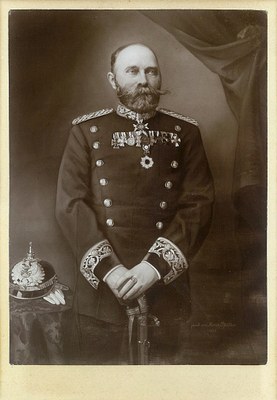A Prussian in Japan

Friedrich Wilhelm Höhn 1839-1892
Photo: Polizeihistorische Sammlung
Berlin
On 2 August 2018, the Mori Ôgai Memorial Center of the Humboldt-Universität zu Berlin (HU) is hosting the special exhibition ‘A Prussian Police Captain in Japan. Friedrich Wilhelm Höhn. A Search for Clues 1885-91’. In the late 19th century, an enormous transformation took place as part of the Meiji Restoration, with the aim of making Japan a modern nation state within a few decades. The exhibition draws attention to the Berlin police captain Friedrich Wilhelm Höhn, born in Oderbruch in 1839, and his role in reorganising the police system in Japan following the Prussian model. Contemporaries even referred to him as the ‘Father of the Japanese Police’.
At the Mimeguri Shrine in Tokyo, a three-metre-high memorial stone – erected in 1894 – still stands to this day, in recognition of Höhn as a foreign teacher and adviser. According to the inscription, he trained four cohorts comprising 553 students in total at the Tokyo Police Academy on behalf of the Japanese interior ministry. These students were senior police officers from a wide range of prefectures. His lectures on the Prussian police system – translated by six interpreters at the time – are now available in book form in Japanese, as are his logs which give an account of his extensive inspection tours throughout Japan.
For 70 years, Höhn’s own records were considered to be lost. However, some of Höhn’s documents could now be rediscovered in the Police History Collection, where they were consigned in 1990 by private owners. Besides photographs from his time in Japan, the trove includes three official travel journals as well as documents from Höhn’s everyday life at the time, such as a schedule of kilometres travelled during his sojourn in Japan and receipts for preserves and sausages imported from Germany as Japanese food did not agree with him. The exhibition reveals the work and traces of this scarcely known Berlin-Brandenburg police captain in Japan in the history of German-Japanese relations.
The exhibition will be shown from 2 August to 20 December 2018 at the Mori Ôgai Memorial Center and from January 2019 in the Police History Collection in Berlin, followed by a travelling exhibition in Oderbruch from spring 2019.

Friedrich Wilhelm Höhn Memorial at Mimeguri Shrine
in Tokyo. Photo: Beate Wonde
Address
Luisenstraße 39, 10117 Berlin
Opening times: Mondays to Fridays
10 am – 2 pm
Phone: +49-30-282-6097
Curated by Beate Wonde. A cooperation with the Police History Collection in Berlin.
About the Mori Ôgai Memorial Center
The Mori-Ôgai Memorial Center is dedicated to the Japanese doctor, scientist, author and translator Mori Ôgai (1862-1922), who studied at the Hygiene Institute of Robert Koch in Berlin in 1887/88. It is devoted to the commemoration and study of the life and work of Mori Ôgai as well as ‘his time’. In this spirit, the scientific and cultural encounters between Japan and Europe since the second half of the 19th century are among the core themes of the memorial. They are cultivated and conveyed in scientific projects, exhibitions, publications and events.
The institution was founded at the HU in 1984. The memorial is located at the site of Mori’s first accommodation in Berlin, on the first floor of Luisenstraße 39.
Further information
Website of Mori Ôgai Memorial Center
Contact
Beate Wonde
Mori Ôgai Memorial Center
Humboldt-Universität zu Berlin
Phone: +49 30 282-6097
mori-ogai-info@rz.hu-berlin.de
